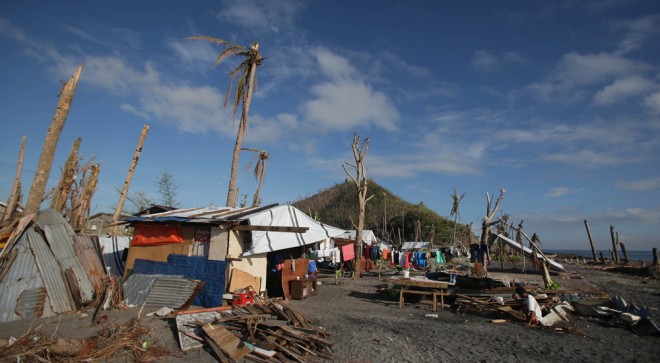
A typhoon survivor, right bottom, cuts wood outside their newly built makeshift house at typhoon-ravaged Tolosa town, Leyte province. Although the Philippines is regularly battered by natural calamities, disaster preparedness and environmental sustainability remain low among the government’s priorities, Jose Ramon T. Villarin SJ, a climate change expert and president of Ateneo de Manila University, said on Tuesday, Sept. 9, 2014. AP FILE PHOTO
MANILA, Philippines–Although the Philippines is regularly battered by natural calamities, disaster preparedness and environmental sustainability remain low among the government’s priorities, Jose Ramon T. Villarin SJ, a climate change expert and president of Ateneo de Manila University, said on Tuesday.
On the sidelines of a forum dubbed “Beyond Growth: Inclusion, Sustainability and Governance” at the Asian Development Bank (ADB) headquarters in Mandaluyong City, Villarin told reporters that the environment only “gets the short end of the stick,” so to speak.
“We need to do more for the environment. We still have a long way to go (in terms of disaster-preparedness), but at least there’s consciousness,” he said.
The country still lacks a strategic effort tying together environmental sustainability and disaster resiliency, said the Jesuit priest. “If you want to be resilient, you have to be sustainable.”
Some disasters might have been avoided had there been adequate mitigation and preventive measures in place, Villarin said, pointing to the destruction caused by Super Typhoon “Yolanda” (international name: Haiyan) in November last year.
“What happened during Yolanda was not a failure of prediction or science. It was a failure of the human factor,” Villarin said. “You can have a hazard that cannot be a disaster. The human makes it a disaster.”
It also did not help that the cycles of natural disasters come and go, but it seemed that not much was being done to deal with them. “The reason things keep repeating is because things are systemic,” he said.
Villarin suggested that the government adopt an integrated systems approach pushing environmental sustainability.
“We need to strengthen our governance and leadership. We should make our leaders responsible for the commons,” he said.
Also, the national and local governments should be able to resolve differences during disaster recovery and rehabilitation, Villarin said. He did not give details.
In the aftermath of Yolanda, Tacloban City Mayor Alfred Romualdez and Interior Secretary Mar Roxas had a well-publicized squabble over relief operations.